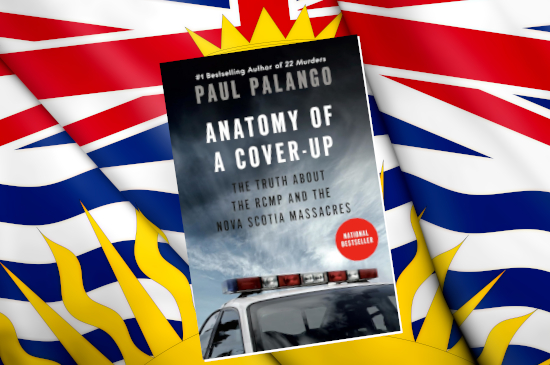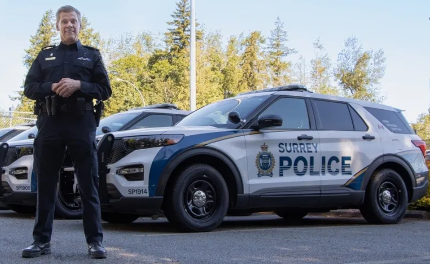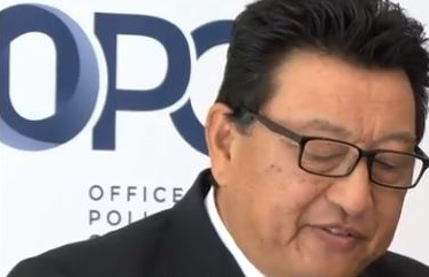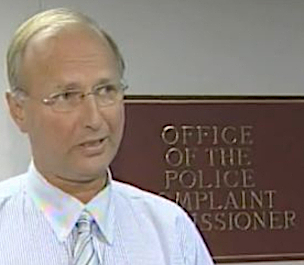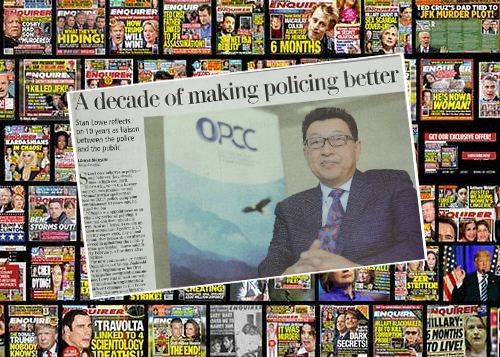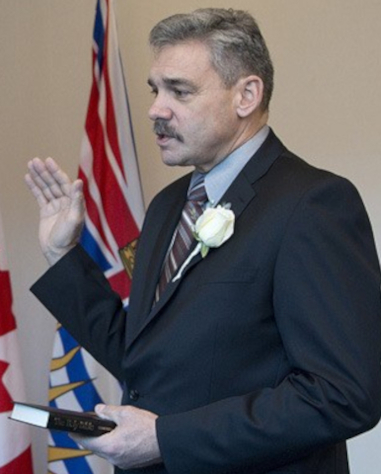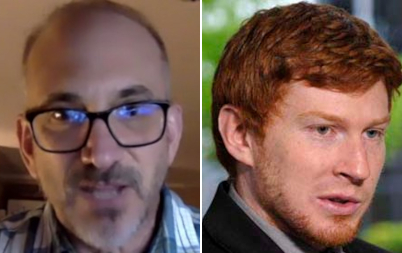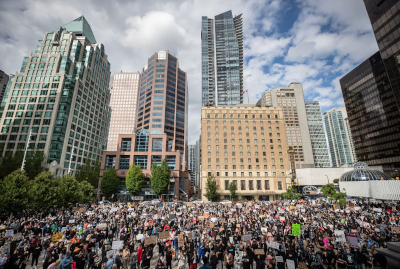A B.C. perspective on
Paul Palango’s RCMP exposé
This province could have written the federal/
Nova Scotia Mass Casualty Commission playbook
July 11, 2025
If it wasn’t already clear, the dysfunction of Canada’s broken-down mess of a federal police force has been revealed definitively in Paul Palango’s Anatomy of a Cover-up: The Truth about the RCMP and the Nova Scotia Massacres. That should especially concern B.C., where 72% of the population and 99% of the geographical area come under RCMP jurisdiction. Some 6,800 Mounties, about a third of the national total, work here.
Although Palango’s book centered on horrific events in Nova Scotia that were related to operations in New Brunswick, his work implicates the entire national force as well as Canada’s elite and our courtier media. His exposé comes as B.C.’s provincial government considers replacing the Mounties, as recommended in a probably ghost-written 2022 legislative committee report. At the province’s insistence the replacement has already happened in Surrey, where B.C.’s second-most populous municipality now has its own municipal cops.
But how would ditching the RCMP improve policing? Efficiency’s a possibility, but ethics and accountability? This province has long shown parallels to the morass exposed by Palango.
Before looking at that, though, it might be useful to question the motive behind Surrey’s new police force and the 2022 recommendations. (Or click here to go directly to the section on B.C. ethical corruption.)
The Surrey plan originated in a 2017 municipal election campaign by the Safe Surrey Coalition headed by supposed crime-fighter Doug McCallum. This was a guy who, in 2003 during a previous stint as mayor, feigned a tough response to a wave of particularly vicious home invasions mostly targeting the elderly. He ordered a bylaw crackdown.
McCallum won the 2017 election but his policing plans made little headway before losing the support of a subsequent city council. The province eventually moved in to impose the new Surrey Police Service over council’s objections.
What might motivate an NDP government to do so, and to consider replacing the rest of B.C.’s RCMP? Maybe to strengthen NDP union support.
Beginning with a faux crime-fighting election ploy and continuing
as an outlet for B.C. union growth, the Surrey Police Service replaced
B.C.’s largest RCMP detachment.
There’s no overstating the importance of union growth to NDP power. That could be the key factor in premier David Eby’s planned multi-billion-dollar expansion of B.C. Housing. Through BCH housing society contractors, additional unionized workers would provide B.C. labour’s greatest source of growth.
But provincial labour lost out when federal legislation finally allowed RCMP officers to form a union in 2019. The Mounties’ National Police Federation has Ottawa headquarters and central Canadian leadership. Surrey cops and civilian workers now have B.C. unions. B.C. labour could gain much more if B.C. replaces or re-hires the other 6,800 Mounties, as well as about 3,680 RCMP civilian employees now represented by Ottawa’s Public Service Alliance of Canada.
As for RCMP dysfunction, Palango says the Mounties’ problems are unique. I think many RCMP problems typify Canadian policing although, as Palango points out, the national force adapted poorly to local policing in so many different cities, communities and regions.
Palango also notes Ottawa’s power to interfere in its federal force. At the municipal level, cop/politician influence can move both ways. Vancouver mayor Ken Sim’s politically dumb decision to select Vancouver Police Union president Ralph Kaisers as an ABC party council candidate might reflect cop influence. Cop favouritism to Sim, on the other hand, would be demonstrated if allegations hold true that Vancouver police covered up a drunken driving offence on his behalf.
Ah yes, cop cover-ups. That’s a B.C. problem too, as are stage-managed inquiries, an ethically corrupt political and legal establishment, pusillanimous media and (a B.C. distinction) opportunistic social justice phonies.
A quick review of some issues raised on this website (B.C.’s sole advocate of police accountability) will show parallels to the events and circumstances revealed by Palango. But of course a huge sense of proportion must be emphasized. The cop misconduct brought to light here doesn’t compare with the RCMP’s handling of Gabriel Wortman’s criminal career and mass murder. My efforts in this project don’t compare with Palango’s accomplishments.
Nevertheless B.C. standards of ethics and accountability show in four municipal cop cover-ups by B.C.’s Office of the Police Complaint Commissioner. These came to light accidentally, despite the agency’s lack of transparency and accountability. No doubt other cover-ups have taken place but one especially egregious example is the multi-year RCMP cover-up of allegations that Prince George Mounties committed repeated acts of sexual misconduct against native teens.
Police complaint commissioner Stan Lowe retired from a career
that was unblemished—by B.C. standards. Despite his four known
cover-ups, he enjoyed unanimous support from B.C.’s political/legal
establishment and courtier media. His slimeball ethics demonstrated
the need for transparency and accountability at B.C.’s Office of the
Police Complaint Commissioner.
Four known OPCC cover-ups concern Vancouver police officer Taylor Robinson, New Westminster officer Sukhwinder “Vinnie” Dosanjh, District of Saanich officer Brent Wray and former Victoria police chief Frank Elsner.
Besides the OPCC cover-ups, the RCMP’s longstanding Prince George cover-up is outlined here and here.
A dishonest cop who became a deputy OPCC commissioner
of cover-ups, Rollie Woods got away with brazen lying to
the media. They still consider him a credible news source.
The four known OPCC cover-ups were conducted by former police complaint commissioner Stan Lowe and his deputy Rollie Woods, previously head of Vancouver police professional standards. They’ve enjoyed the full support of all B.C. political parties, media, salaried “activists” and legal establishment.
Starting with the latter, the Law Society of B.C. responded to my complaint about Lowe, a practising lawyer, by dishonestly stating I provided “no evidence” of the Robinson cover-up. An irrational and downright angry letter from the Law Society’s Beverly Gallagher revealed more about B.C.’s legal establishment than she likely intended. Gallagher’s manager, Katherine Crosbie, supported her.
As for politicians, MLAs from all B.C. parties fully and unquestioningly support the cop status quo including the cover-ups. They’ve demonstrated that through a long series of all-party legislative committees, which have recommended cop-friendly OPCC appointments and Police Act tweaks. Committee members from all B.C. political parties unanimously rejected evidence of OPCC cover-ups, calls to impose transparency and accountability on the agency, and calls to place allegations of sexual misconduct—including rape—under the civilian authority of B.C.’s Independent Investigations Office. The latter reform most likely would have prevented cover-ups like that of Prince George RCMP.
Here’s a detailed account of B.C. legislative committees and their work.
The committees show parallels to the federal/Nova Scotia Mass Casualty Commission exercise revealed by Palango—the stage-managed process, rejection of important but inconvenient info, advance conclusions and unanimous compliance.
Another MCC similarity involves the manipulation of woke jargon and sentiments to obfuscate policing issues and prop up the cop status quo. Using that strategy the 2022 legislative committee report made highly nebulous recommendations that would create different (but very vaguely described) complaint procedures for different identity groups. None of that would improve police accountability.
One striking example of that sham process recommends that children (indigenous girls) help oversee investigations into police. (See page 64, recommendations 5.7 and 9.2 iii.) Did 10 MLAs actually agree on that? More likely 10 MLAs signed off on recommendations they didn’t make, didn’t write and didn’t even read.
Ex-Mountie and current solicitor general Garry Begg sat on legislative committees
that unanimously rejected calls to apply transparency and accountability to the OPCC
and to give B.C.’s civilian Independent Investigations Office jurisdiction over allegations
of cop sexual misconduct including rape. Vancouver Postmedia considers Begg
a likely reformer of B.C. policing.
B.C.’s current solicitor general, ex-Mountie Garry Begg, served on that committee and at least two more. Like all other MLAs, he’s repeatedly rejected calls to bring transparency and accountability to the OPCC, and to have independent civilian investigation into allegations of sexual misconduct including rape.
Soon after the last two of Stan Lowe’s four known cover-ups accidentally came to light,
Victoria Times Colonist reporter Louise Dickson celebrated him in an especially sycophantic
tribute. Sucking up to the OPCC has been a Times Colonist tradition also carried out by
reporter Katie Derosa. Vancouver Postmedia has since hired Derosa.
Like compliant peas in a putrid little pod, B.C.’s media also reject all that inconvenient stuff: the cover-ups (the Prince George allegations comprise a partial exception), the need for OPCC transparency and accountability, and the need for civilian investigation of sexual misconduct allegations. Nor will B.C. media acknowledge the sham process of legislative committees.
With only blue-moon exceptions, B.C. journalists prove themselves feckless, arrogant, cowardly or sycophantic. Examples abound, but a few of the more outrageous cases include Vancouver Postmedia legislative correspondent Vaughn Palmer’s pitiful naiveté about legislative committees, Vancouver Sun reporter Tiffany Crawford’s sub-literate confusion and snotty arrogance, Victoria Times Colonist reporter Louise Dickson’s cringing sycophancy to Lowe (also typical of her colleague Katie Derosa, who’s since been hired by Vancouver Postmedia), Vancouver Postmedia reporters Kim Bolan and Dan Fumano portraying lying ex-cop and corrupt OPCC deputy Woods as a credible media source, Derosa at the Times Colonist doing the same, Postmedia reporter Gordon Hoekstra’s enormous gullibility about “reformer” Garry Begg, and the province-wide media’s rejection of a press release with seven backgrounders providing easily verifiable info and good story leads.
That last one happened way back in 2011 but the media snub has persisted, even as problems with police accountability have become increasingly evident.
Having been solicitor general, opposition critic for solicitor general and at least twice
a member of legislative committees on policing, Mike Morris enthusiastically supported
Stan Lowe, rejected calls to bring transparency and accountability to the OPCC, and rejected
calls for civilian investigation of cop sexual misconduct including rape. Up to 2005, the
Prince George resident headed northern B.C’s RCMP while the Prince George RCMP
sexual misconduct cover-up was underway. None of this interests B.C.’s journalists
or salaried activists, let alone B.C.’s political and legal elite.
As well, B.C.’s entire media ignored this troubling information about Mike Morris, a former solicitor general who opposes civilian investigation of cop sexual misconduct. Guess what—Morris headed Prince George RCMP as repeated cop sexual misconduct against native teens allegedly took place.
APTN (Aboriginal Peoples Television Network) joined the unofficial media blackout about Morris. The B.C. First Nations Justice Council says almost nothing about anything, squandering its tremendous potential to influence reform. Former Green MLA and legislative committee stalwart Adam Olsen repeatedly proved himself a native sell-out. He’s now a regular media source on policing issues, despite having nothing intelligent to say.
American poverty pimps Scott Bernstein and Doug King of the Pivot Legal Society
represented a disabled native woman who was shoved to the ground in a gratuitous
Vancouver police assault. Bernstein and King stayed quiet during a joint OPCC/VPD
cover-up. King later praised OPCC boss Stan Lowe’s handling of the matter. Pivot’s
collaboration also discredits former directors and management like human rights
commissioner Kasari Govender and premier David Eby.
A pestilential B.C. distinction seemingly not paralleled in the Maritimes are salaried social justice phonies. Media take these characters very seriously, profoundly so, oblivious of their shallow opportunism. Pivot Legal Society police accountability spokesperson Meenakshi Mannoe draws a paycheque by reciting fashionable, simplistic jargon without saying anything specific. Two American lawyers with Pivot, Scott Bernstein and Doug King, collaborated in the VPD/OPCC Robinson cover-up. Pivot’s silence on this matter continues to tarnish Pivot spawn like B.C. human rights commissioner Kasari Govender and premier David Eby.
Eby’s early career path also drew him to the B.C. Civil Liberties Association which generally follows B.C.’s code of silence on policing issues. Under Eby’s leadership, and soon after I challenged the group to speak out on the Robinson cover-up, the BCCLA scrapped its police accountability committee.
B.C.’s demo culture might be Canada’s largest. But the fixation on domestic
American issues distracts attention from the machinations of Canada’s elite.
An additional hindrance to any kind of reform is the domestic American preoccupation of B.C.’s demonstrator culture (probably Canada’s largest). The George Floyd demos actually benefited this country’s cop status quo, as do the other copycat American causes that divert attention from Canada’s elite.
So much for this province. It’s hard to determine whether B.C. differs from other parts of Canada in its tolerance—and sometimes outright enthusiasm—for corruption. But this is a province that could have written the playbook for the Mass Casualty Commission.
Palango, a Nova Scotia resident, has been called Canada’s last investigative journalist. We should thank him not just for exposing a federal/New Brunswick/Nova Scotian scandal, but for holding a mirror up to B.C.
Read more about Paul Palango’s Anatomy of a Cover-up:
The Truth about the RCMP and the Nova Scotia Massacres
Go to News and Comment page
